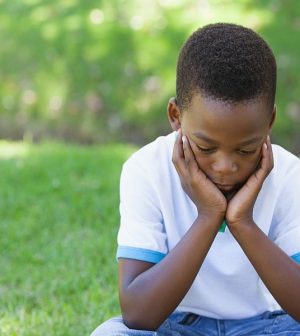- Could Your Grocery Store Meat Be Causing Recurring UTIs?
- Are You Making This Expensive Thermostat Error This Winter?
- Recognizing the Signs of Hypothyroidism
- 10 Strategies to Overcome Insomnia
- Could Artificial Sweeteners Be Aging the Brain Faster?
- Techniques for Soothing Your Nervous System
- Does the Water in Your House Smell Funny? Here’s Why
- Can a Daily Dose of Apple Cider Vinegar Actually Aid Weight Loss?
- 6 Health Beverages That Can Actually Spike Your Blood Sugar
- Treatment Options for Social Anxiety Disorder
Giving Your Child a Time-Out Won’t Cause Long-Term Damage: Study

Time-outs don’t increase kids’ risk of emotional or behavioral problems, according to a new study that researchers say dispels misleading information.
The study included the children of nearly 1,400 U.S. parents. Of those parents, 28% said they used time-outs when their child was 3 years old.
From age 3 through fifth-grade, there were no differences in emotional and behavioral health between children who had time-outs and those who did not, the investigators found.
Rachel Knight, an assistant professor of clinical psychology at University of Michigan C.S. Mott Children’s Hospital in Ann Arbor, led the study, which was published online recentlyin the Journal of Developmental & Behavioral Pediatrics.
“No differences were found with respect to child internalizing problems, including anxiety and depression, externalizing problems, including aggression and rule-breaking behavior, or self-control,” Knight’s team reported.
The authors noted that time-out is one of the only child discipline strategies recommended by the American Academy of Pediatrics.
Even though extensive research has shown it to be effective, some online information and media reports have claimed time-outs increase the risk of behavioral problems and damage parent-child relationships, the study authors explained.
“Parents often resort to the internet and social media for guidance, but the internet provides inaccurate information for families regarding the use of time-out,” Knight and her colleagues warned.
Research findings on the topic need to be offered in a “readily accessible and easily digestible format … to assuage possible parental concerns and promote the use of this highly effective child discipline strategy,” the study authors urged.
However, as with previous research, the new study linked physical punishment to externalizing behaviors in kids.
“We hope our findings will be helpful to parents who see confusing and at times alarming claims of negative side effects of time-out,” Knight said in a journal news release.
More information
The American Academy of Pediatrics explains how to give time-outs.
Source: HealthDay
Copyright © 2026 HealthDay. All rights reserved.










